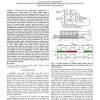419 search results - page 5 / 84 » Impact of Technology Scaling in the Clock System Power |
HPCA
2003
IEEE
14 years 11 months ago
2003
IEEE
With the scaling of technology and the need for higher performance and more functionality, power dissipation is becoming a major bottleneck for microprocessor designs. Pipeline ba...
DAC
2004
ACM
14 years 2 months ago
2004
ACM
The high leakage current in nano-meter regimes is becoming a significant portion of power dissipation in CMOS circuits as threshold voltage, channel length, and gate oxide thickne...
ICCD
2007
IEEE
14 years 3 months ago
2007
IEEE
This paper presents a novel power reduction method for chip multi-processors (CMPs) under real-time constraints. While the power consumption of processing units (PUs) on CMPs can ...
ISLPED
2003
ACM
14 years 4 months ago
2003
ACM
A significant fraction of the total power in highly synchronous systems is dissipated over clock networks. Hence, low-power clocking schemes would be promising approaches for futu...
ASPDAC
2008
ACM
14 years 1 months ago
2008
ACM
Meeting power and performance requirement is a challenging task in high speed ALUs. Supply voltage scaling is promising because it reduces both switching and active power but it al...

